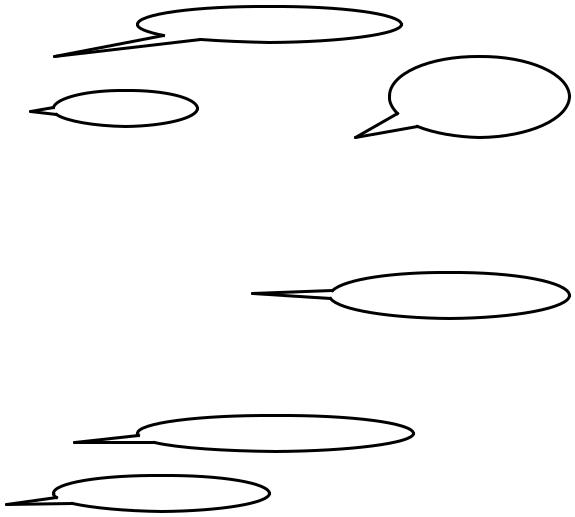
Английскй учебник
.pdf
Email is used to communicate in many settings. Effective use of email requires a clear sense of the purpose for writing, as well as a clear statement of the message.
Email is not the same as talking to someone face-to-face or even over the telephone. When we talk face-to-face, we pick up meaning from facial expressions, body language, specific gestures, and, of course, tone of voice. Even telephone conversations preserve the meanings conveyed by tone of voice. But email messages lose these extra ways of conveying meaning as we exchange messages, and so writers need to take care when writing email messages, even though they seem impromptu or off-the-cuff.
The best general advice: What you include in your email message depends on why you are writing and to whom. Effective email messages are short and to the point. Receivers don't want to scroll through two or more screens of text to get your message. On the other hand, don't make your messages so short that the receiver doesn't understand you. Provide enough information so that the receiver understands both the context and the details of the message
Because email messages lack tone of voice and gestures that communicate so much during face-to-face and telephone conversations, some email writers include emoticons* to indicate humor, sarcasm, excitement, and other emotions; for example, :) is a happy face. As a writer, you’ll know which personal messages can include these touches, but they’re generally frowned upon in professional contexts.
Similarly, you may feel comfortable writing personalized abbreviations (such as imho for "in my humble opinion") in personal or social messages, but they are generally not considered appropriate for professional communications.
|
*emoticons – , |
& %, " |
|
|
|
|
|
|
|
|
|
|
EMOTICONS |
|
|
|
:) or :-) |
|
happiness, sarcasm, or joke |
|
:( or :-( |
|
unhappiness |
|
:] or :-] |
|
jovial happiness |
|
:[ or :-[ |
|
despondent unhappiness |
|
:D or :-D |
|
jovial happiness |
|
:I or :-I |
|
indifference |
|
:-/ or :-\ |
|
undecided, confused, or skeptical |
|
:Q or :-Q |
|
confusion |
|
:S or :-S |
|
incoherence or loss of words |
|
:@ or :-@ |
|
shock or screaming |
|
:O or :-O |
|
surprise, yelling or realization of an error |
|
Abbreviations |
|
|
|
AAMOF |
|
as a matter of fact |
|
BBFN |
|
bye bye for now |
|
BTW |
|
by the way |
|
BYKT |
|
but you knew that |
|
CMIIW |
|
correct me if I'm wrong |
|
EOL |
|
end of lecture |
|
FAQ |
|
frequently asked question(s) |
|
FITB |
|
fill in the blank |
|
FWIW |
|
for what it's worth |
|
FYI |
|
for your information |
|
HTH |
|
hope this helps |
|
IAC |
|
in any case |
|
|
|
|
81

2. !' (A, B), ! '
. , $ ! !'.
1.How many parts does email comprise?
2.What are these parts? Name them and translate into Russian.
3.How can we greet friends and good acquaintances?
4.How should we address to strangers and officials?
5.What kind of information does the opening sentence of email contain?
6.Is an effective e-mail long or short?
7.Is an effective email divided into paragraphs? What for?
8.Do we use red lines or white space to visually separate paragraphs into separate blocks of the text?
9.Is there anything brief but friendly in the closing salutations?
10.What else information should we put in closing? What for?
A.
addressee (recipient)
To: glenn@yahoo.com |
opening sen- |
|
|
|
|
Dear Glenn, |
greeting |
tence (purpose) |
|
||
I am writing this email to apologize for the way I behaved with you yesterday. I want to clear all the misunderstanding that is there between us :( or :-(.
Today I would like to tell you something that I have never told you before. If I have understood the meaning of true friendship, then the person responsible for it is you. I still, remember the days when we used to have fun together during school days and when you used to stand up for me whenever I was punished. I still remember how you used to help me with my homework. You protected not
only as a friend but also as an elder brother.
the main part (action)
But, I don’t want to lose all those lovely memories only because of one misunderstanding. I am sorry for behaving with you rudely. I was not aware of the situation, so I shouted at you. Please forgive me, my friend.
With regards, |
close salutation (ending) |
|
|
Your best friend, |
|
Sam |
signature (name) |
|
82

B.
To: Wayne.Mackenzie@gmail.com
Hello Mr. Mackenzie
I am Kate Williams and I am staying right next to your premises. This email was in regard of loud noises coming from your house which is unbearable to most of the neighbours including me which are residing adjoining to your property.
Due to our different work timings it wasn’t possible to come personally and explain the things. Though I have tried few times but you were not present at your place. Till date I was not aware of your work timings and came to know that you have night working hours. Your absence have made your kids go little wild and seems creating havoc for us by partying most of the night.
I took it as a duty to inform you regarding the same as you might not be aware of the situation back home. I would request you to take this email into consideration and take necessary steps.
Thanking You
Sincerely
Jane Miller
Ph: 290-998-0651
3.& !' ()) « » , -
, ! $ .
4.!'
!'.
1.Thanking you,
2.To: Robert.Jones@gmail.com
3.We were in high spirits when we visited your restaurant but the place was packed, it seems that the sitting arrangement was done haphazardly and your restaurant staff was unable to cope up with the demanding crowd. Being your well-regarding restaurant in our locality this kind of food & welcoming is disgraceful. The only good thing was that the staff members politely listened to our whining about the food and catering service.
4.Jennifer Bentley
83

5.My friends and I visited your restaurant last week to celebrate one of my friend’s birthday party. I am sorry to say the food served was of poor quality and now it has built a second opinion in our minds whether to visit it again or not.
6.Dear Mr. Jones
7.I am writing an email to you to bring in attention and improve your food quality, being a famous restaurant it has to match up to the standards of its name.
5. ( & !$ . , #
, – -
# ! #. ! .
Salutation |
Opening sentence |
Conclusion |
Close salutation |
|
|
|
|
|
|
|
|
|
|
|
|
|
|
|
|
|
|
|
|
1.Dear Sir or Madam
2.[no name or no close]
3.Hello
4.Best wishes
5.Feel free to get in touch if you have any questions
6.Hey
7.Bye
8.Dear all
9.I'm writing to thank you...
10.Yours sincerely
11.Just a short email to inform you...
12.All the best
13.Dear Mr., Mrs., Ms.
14.Looking forward to your reply
15.To whom it may concern
16.Let me know if you need anything else
17.Hi everyone
18.Best regards
19.Do not hesitate to contact us if you need any assistance
20.See you (soon)
21.I look forward to hearing from you
84

4. !' & .
To: sam@yahoo.com
Dear Mr. Rockwell,
We, Mr. and Mrs. Clarke would like to announce the graduation of our son Michael Clarke on 10th December, 2010.
Our son, Michael was pursuing Bachelor of Arts in media studies from the University Of South Dakota College Of Media Studies in Film and Television. He had joined the university on 5th December 2006. He has always been a constant performer and an idol student His grades have always been good throughout the tenure of the course. His constant performance and dedication towards his studies has made us proud parents.
The University is holding a graduation ceremony. The graduation ceremony will take place on 10th of December, 2010 at the college premise and the program will commence from 10 in the morning. We would like to invite you for being a part of the ceremony. Your presence is important for us, so please join us in blessing our son for a bright future.
Thanking you,
Mr. and Mrs. Clarke.
5. , & !': |
|
) ) " |
"; |
) *, |
; |
) , $ % " ;) $" $ " -;) , " .
UNIT 6. TEST YOURSELF
1. . ' .
Good communication skills project an image of confidence and____1____. Although some of them are natural and go without saying some of them still can be acquired by practice and preparation. Sometimes it’s useful to develop a strategy when you want to start a conversation with someone you don’t know.
85
•Start with “hello” and simply tell the other person your ___2___ and ask them theirs. Then offer your ___3___ to shake.
•Look around and see if there is anything unusual to point out. (Talking about the ____4____
is probably not a good idea unless there is something very unusual about it – a storm, snow, tornado, etc.) “Have you seen that picture over there?” – “This is an interesting building. I wonder how old it is.”
•If you can, offer a ____5____ about something, but only if it is sincere and not too personal. For example, “I saw you using a MacBook – looks very nice. Are you happy with it?”
•Ask questions which will make the other person feel that they are interesting. People like talking about themselves but don’t make the questions too personal. Ask for their ___6____
about things and their possible experience of current ___7____ and situations. “Have you been affected by this strike?” It’s not a bad idea to mentally prepare a list of possible
____8___ before you begin the conversation. Avoid politics and ___9____ because they are sensitive subjects for some people.
•Instead of worrying about what you are going to say next, ___10___ carefully to what the other person is saying and take up any conversation opportunities they offer you. Agree, disagree, ask follow-up questions and ___11___ opinions to show you are interested.
•Look the other person in the eyes, but don’t ___12___ or get too close. Smile occasionally, but avoid using a fixed grin.
Name, compliment, offer, topics, intelligence, opinions, listen, weather, religion, issues, stare, hand
2. . (True or False).
1.To start a conversation with someone you don’t know doesn’t require any skills.
2.Start with smiling and hugging.
3.Talking about the weather is the best idea.
4.People like compliments and are happy when they are very personal.
5.People like talking about themselves.
6.It is safe to speak about present situations.
7.It is a good idea to make up a list of possible questions.
8.When you know what to say it’s not necessary to listen what the person is saying.
9.Stare the person and get close.
10.Smile as often as you can.
3. .
1.How to form good communicative skills.
2.How to start a conversation.
3.How to impress people with good manners.
4.How to make people love you.
4. % , & .
preparationavoidunusualmentallystrategyshowacquireconfidencetornadocurrentofferstrikesincere experiencelookunlessexampleworrygrinoccasionallyconversationoveragree.
5. .
86
1.Effective cross-cultural communication is __________
a) skills
b) knowledge c) good manners
2.Semiotics is the science about ___________
a)mental processes and behaviour
b)the role of social institutions in the shaping of culture
c)signs and symbols, especially as elements of language
3.Haptics implies ___________
a) the use of body space b) touching behaviour c) mime and gestures
4.When a person is sad ____________
a) his eeyebrows up, lips down-turned
b) his lips tightened, eyebrows pulled down c) his top lip is raised
5.Japanese people do not like ______
a)to see a ballet
b)to bow
c)to refuse something
6.In the Arab world it is offensive to __________
a) show the soles of one's feet to another person b) have close conversational distance
c) shake hands
7.In Australia the "V" emblem is a sign of __________
a) good will, victory, and solidarity b) a lewd and sexual meaning
c) failure and crisis
GLOSSARY
1. awareness – 1) , ; 2) ! ,
ethnic ~ - % legal ~ -
be aware of … - $, $
2. competence – $ , !,
communicative ~ - competent – ", ", " ( )
~user – " $ $ (
~officer – "
3. counterpart – $ , #' , , ,
(#)
87
British lawyer and his American counterpart – " " have no ~ – $
4. culture –
cultural –
~anthropology – $
~background – $ &
~bias – $ &
~conflict – #, $
~group – $
~identity – $ $
~studies – $
~studies scholar – $
~values – $ cross-cultural – &$ "
~communication – &$
~interaction – $
~studies – $ $ intercultural communication – &$ culturally – $ )
~and linguistically diverse communities – , $ -
)
5. diversity – 1) !, !; 2)
cultural ~ - $ , $
cultural, religious and linguistic ~ - $ , diversify – $, $ $
diverse – 1) ", & "; 2) ", "
6. impression – 1) ; 2) , , ; 3) ,
,
make (to produce) an ~ on smb – - have a vague ~ of smth – $ -
~ of fingers – $ ~s of traces -
7. prejudice – ,
have a ~ against smth – $ & -
a ~ in favour of smb – ( & )) ) - prejudice – $
~ smb against smb – $ - -
8. relationship – 1) &; 2) &,
~ of languages – have ~s with smb – $ ) - break off ~ - $ )
cause and effect ~ - - $
10. skill – 1) , ; 2) , ; 3)
communicative ~ –
practical communication ~ s – skilled - ", ", "
11. socialization – $ $ , !' language ~
primary ~ -
socialize – $, $ &
88

MODULE 4
Business Communication
UNIT 1. BUSINESS ENGLISH
1., . * $ !'-
# #?
A. |
B. |
C. |
D. |
E. |
F. |
2.* # # $ , ?
•Job applicant is answering interviewer’s questions.
•A businessman is meeting a colleague from abroad.
89

•A man is booking a ticket by phone.
•Students are getting to know each other after the first day in a language school.
•A man is filling in a form for money transfer in a bank.
3.. . (
$ 1 !' ! &
! ?
Will, would, could (2), do (3), is (2), are, was, have (2), shall
1.What … your full name?
2.… I fill in all the blanks here?
3.… you spell your name, please?
4.… you worked in such companies before?
5.Where … you staying while you are here?
6.How … your flight?
7.… you got any special reasons for learning English?
8.… you have any flights to Prague next Tuesday afternoon?
9.Why … you want to work for our company?
10.… you put your signature here, please?
11.If we give you a discount … you promise to deliver on time?
12.How much … you like to transfer?
13.… this your first visit to Moscow?
14.… you give us a discount if you agree to our conditions?
4.% ! . , 3,
.
5.“business”. * , ( & #,
“business” “Business English”? ( -
' ! “business”
?
•The activity of buying and selling goods or services that is done by companies. E.g. We do a lot of business with Italian companies.
•An organization such as a shop or a factory which produces or sells goods or services. E.g. Paul’s decided to start his own business.
•The amount of work a company is doing. E.g. Business is slow during the summer.
•Any serious work or activity. E.g. Let’s get down to business.
•Any occupation or activity, usually opposed to doing nothing. E.g. I’m here on business.
6.. * “business”
5 “Business English”. # .
90
